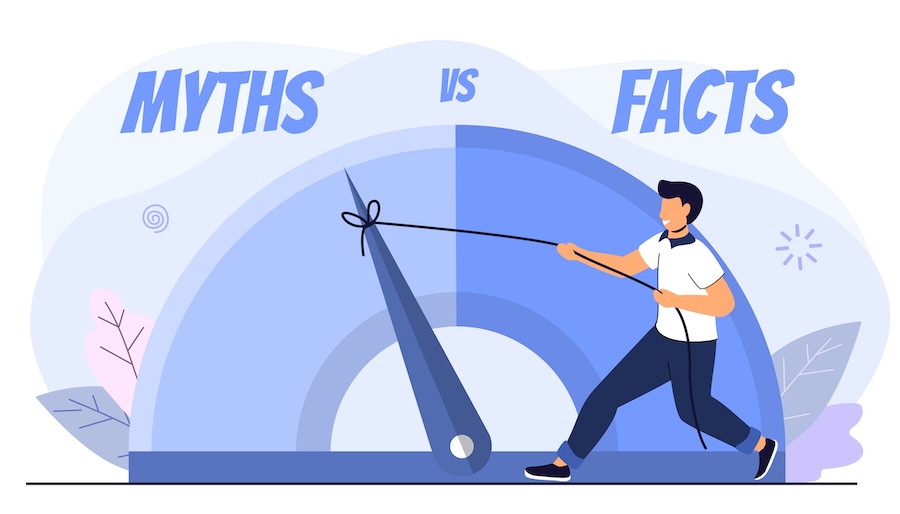Even with access to more health information than ever before, dental myths still find their way into everyday conversations—and often into daily habits. These beliefs don’t come from nowhere. They’re typically rooted in family advice, old experiences, or things we’ve heard so many times they start to feel true. At Southwest Smiles in Austin, TX, Dr. Lakshmi Chittajallu understands how these ideas take hold. That’s why part of effective dental care includes not only treatment, but also clearing up the confusion that surrounds it. In this article, we take a closer look at a few of the most persistent myths—and offer clarity grounded in modern dental science.
Myth #1: Flossing Causes Bleeding Gums
A common belief is that flossing damages the gums and causes bleeding, particularly in individuals who have not flossed consistently. In reality, bleeding gums are not caused by flossing itself, but rather by inflammation due to plaque and bacterial buildup between the teeth.
When patients begin flossing after a period of neglect, the inflammation already present in the gum tissue becomes more apparent. Continued flossing—done gently and consistently—actually reduces bleeding over time by decreasing inflammation. If bleeding persists beyond a week or two, it may indicate early gum disease and should be evaluated by a dental professional.
Myth #2: Cavities Are Caused Only by Sugar
While sugar plays a role in the development of cavities, it is not the sole cause. Dental caries result from acid-producing bacteria that metabolize carbohydrates—including both sugars and starches—left on the teeth.
Frequent snacking, dry mouth, inadequate brushing, and delayed oral hygiene all contribute to the conditions that allow decay to progress. The frequency of sugar consumption and how long it remains on the teeth are more critical factors than the amount consumed. Regular brushing, flossing, and limiting between-meal snacks are more effective cavity prevention methods than avoiding sugar alone.
Myth #3: “Bad Teeth Run in My Family”
Genetics can influence certain dental traits such as enamel thickness or susceptibility to gum disease. However, most oral health conditions are primarily shaped by environmental factors and behavior.
Daily hygiene, dietary choices, and consistent dental check-ups play far greater roles in determining the health of an individual’s teeth and gums. While a family history of dental issues may increase risk, it does not predetermine outcomes. Preventive care remains the most effective way to manage and minimize genetic risks.
Myth #4: Pregnancy Causes Tooth Loss Because the Baby “Takes the Calcium”
This widely held myth suggests that during pregnancy, the developing baby depletes calcium from the mother’s teeth, resulting in tooth loss or damage. In fact, the body adjusts to pregnancy by increasing calcium absorption from food, not by pulling it from the teeth.
The increased risk of oral health issues during pregnancy stems from hormonal changes that make the gums more sensitive to plaque, along with side effects such as morning sickness, dietary shifts that may impact enamel health, and disrupted sleep patterns that can interfere with regular oral hygiene routines. Maintaining regular dental appointments during pregnancy and adhering to daily oral hygiene are essential for protecting both maternal and fetal well-being.
Myth #5: Baby Teeth Are Unimportant Because They Fall Out
It is a common misconception that baby teeth do not require professional attention. In truth, primary teeth play a critical role in a child’s development. They preserve the space for permanent teeth, facilitate clear speech, and aid in proper chewing and nutrition.
Neglecting baby teeth can lead to premature loss, misalignment, and infections that affect permanent teeth. Children should have their first dental visit by age one or when their first tooth appears. Early dental care helps establish a foundation for lifelong oral health.
Evidence Backed Care at Southwest Smiles in Austin, TX
Good oral health starts with accurate information. When patients understand the reasoning behind their care, they’re better equipped to make choices that truly support long-term outcomes. At Southwest Smiles, Dr. Lakshmi Chittajallu and her team focus on providing that clarity—balancing professional guidance with a personalized approach. Whether you’re managing a specific concern or simply want reassurance that you’re on the right path, we’re here to help. To schedule a consultation or exam, we invite you to contact our Austin office. Let’s build your dental health on facts that last.

